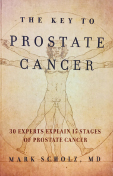
Mark Scholz, MD
To dig a bit deeper into some of the issues touched upon in the new book, The Key to Prostate Cancer: 30 Experts Explain 15 Stages of Prostate Cancer, The ASCO Post recently spoke with the author, Mark Scholz, MD. Dr. Scholz is a medical oncologist who exclusively treats men with prostate cancer. Whereas other books may espouse different treatments for prostate cancer, Dr. Scholz’s book espouses treatment selection.
Unique Oncology Practice
Please tell us a bit about Prostate Oncology Specialists and your unique position in the oncology community.
I don’t believe it’s an exaggeration to say we are the only oncology private practice fully dedicated to prostate cancer in the country. If we receive referrals of patients with lung or colon cancer, for instance, we refer them elsewhere. I have two other full-time oncologists who treat prostate cancer alone. Also, medical oncologists mostly see relapsed or metastatic disease. We see that, of course, but early-stage disease, which is so much more common, is the bulk of our practice. This past year, we saw close to 700 new patients, so we have a robust patient flow.
What advantage do men have at Prostate Oncology Specialists over the traditional urology route?
For one, we are starting to see more men with elevated prostate-specific antigen (PSA) levels who don’t want to go for a random biopsy, but want magnetic resonance imaging (MRI) first. I think we may be the only medical oncologists in the world who do our own biopsies. We use high-resolution color Doppler ultrasound and do fusion- and image-guided biopsies. The reason for this is multifold, but the obvious one for men is that it obviates the route to a 12-core needle biopsy, which has several potential risks along with being highly imprecise, leading to unnecessary procedures.
Debate Over PSA Test Continues
After decades of heated debate, the PSA test’s clinical value is still a point of contention. What are your thoughts on the role of PSA testing?
In 2012, the U.S. Preventive Services Task Force recommended against PSA screening, and then in 2017, it upgraded its recommendation to a C, which encourages a doctor-patient discussion before making the decision to have the test. So it’s easy to see how men are confused. Most PSA values are under 10 ng/mL, which have no predictive value for cancer. It could be elevated by recent sex, prostatitis, a poor lab value, and so on. But this entire hullabaloo about PSA testing is misplaced; the real concern should be about the 1 million random biopsies America men have each year. We should value the PSA test and think of it as a check engine light on the dashboard of a car.
So what do you do when a PSA check-your-engine light flashes?
A urologist will most likely do a random biopsy, which is associated with risks such as infection, erectile dysfunction, pain, and, most important, overdiagnosis of low-grade Gleason 6 disease. When that same patient comes to us with an elevated PSA, instead of doing a core biopsy, we’ve been relying on the 4Kscore Test, which provides a percentage readout of the likelihood of clinically significant, Gleason 7 or above, prostate cancer. If the test comes back highly favorable, we watch those patients and won’t do imaging or biopsy. That eliminates about 10% of the patients from biopsy.
This entire hullabaloo about PSA testing is misplaced; the real concern should be about the 1 million random biopsies American men have each year.— Mark Scholz, MD
Tweet this quote
The next step is evaluation with a state-of-the-art multiparametric 3-Tesla MRI. The value of this approach has been validated in a 500-patient prospective randomized trial that was recently published in The New England Journal of Medicine. The researchers found that MRI was distinctly more likely to detect clinically significant prostate cancer and avoid a biopsy. If we do find an actionable lesion, we do a targeted biopsy—never a random 12-core procedure. We have had great success and patient satisfaction with this method.
Gleason 6 Cancer Controversy
Another controversy in prostate cancer is the Gleason 6 cancer, which a growing number of experts claim should be renamed as a noncancer. What are your thoughts on this issue?
I passionately welcome the day when we rename the Gleason 6 cancer as a noncancer. Applying the word ‘cancer’ to a Gleason 6 tumor, which has never been shown to have the capacity to metastasize, provokes anxiety and unnecessary treatment decisions. One reason that Gleason 6 cancer leads to treatment is fear the biopsy missed a dangerous lesion lurking in some other region of the prostate. And the multiparametric 3-Tesla MRI approach I mentioned solves that problem. ■
DISCLOSURE: Dr. Scholz reported no conflicts of interest.


